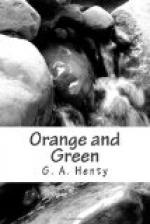“I must not let you go on any more detached commands, Walter,” his father said. “I do not say that you have been imprudent, or to blame; but this is the second time that you have been surprised by the enemy, and, as it is out of the question to expect that you can always have the good luck to get out of their hands when you are captured, as you have on the last two occasions, I shall keep you by me in future; for seriously, my boy, your absence has caused me terrible anxiety.”
When Walter’s account of the barbarous sentence passed upon the peasants, whose only crime was that they had defended their property against marauders acting in defiance of the general’s order, was known in camp, the most intense indignation prevailed, and this was heightened by the fact that a cavalry officer, taken in open fight, should have been sentenced to a similar fate. So great, indeed, was the fury of both officers and men, that had they been in any condition to take the field, nothing could have restrained them from mounting and riding, at once, to strike a blow in revenge for the murder and mutilation of the peasants.
Chapter 16: Peace.
Ginckle’s expedition across the Shannon, and his surprise of the Irish cavalry camp, successful as it had been, altered the position in no way. Several days passed, and then, after a council of war, it was determined to recross the bridge of boats, which remained undisturbed, to the Clare side, and try to force a way across Thomond Bridge. On the 22nd of September, all the cavalry of the army, ten regiments of infantry, and fourteen pieces of cannon made the passage without molestation, and marched towards the bridge, which was defended upon the Clare side by two strong towers. As the British advanced guard of infantry approached the bridge, it was charged by a body of Irish horse, broken, and driven back.
A strong body of cavalry rode up to support the infantry; the Irish horse were reinforced, and a hot fight continued until, at about four o’clock in the afternoon, the whole force of British infantry came up, and the Irish retired upon the infantry posted in the works which covered the bridge. Near the gate were high grounds cut up by gravel pits. The Irish infantry were posted here, as well as in the forts; and the English, as they advanced, were assailed with a very heavy fire from these positions, and also from the guns on the town walls.
In spite of the heavy loss they were suffering, the English pressed on with the greatest gallantry. Success was now almost a necessity, for, if defeated, but few of them would ever have been able to recross the river. Foot by foot they fought their way, pressed on past the outworks, and pushed back the Irish infantry, till the latter were gathered round the head of the bridge.




